Samsung Galaxy Nexus & Ice Cream Sandwich Review
by Brian Klug & Anand Lal Shimpi on January 18, 2012 1:34 PM ESTBattery life remains the other big axis on which smartphones are judged, and here we've turned to our regular 2011 suite of battery life tests to see how the Galaxy Nexus shakes out. Our battery life testing consists of a page loading suite which loads through a few dozen pages endlessly on both WiFi and cellular data until the phone dies, with the display set at 200 nits. For the cellular tests, we're always careful to test in cellular environments with decent signal (at least -75 dBm or higher) as well, since that's a factor. Next is a simple call test where we play music at both ends of a call until the device under test dies, and our final test is a WiFi hotspot workload which consists of four page loading tabs and a 128 kbps streaming MP3 station that runs until the phone dies.
First up are the web browsing tests over cellular 3G; this means EVDO Rev.A for the CDMA/LTE version, and WCDMA T-Mobile for the GSM/UMTS device.
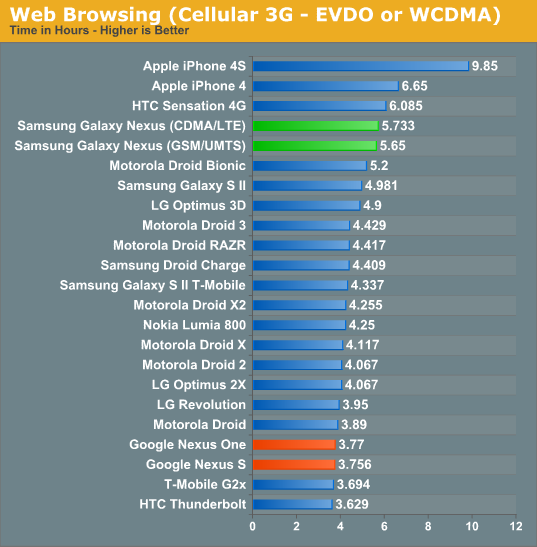
The Galaxy Nexii both do surprisingly well. I'm actually very impressed with how long the devices lasted subjectively on 3G and this definitely backs that up. Of course, both devices include beefy batteries, but Samsung has done a nice job thus far including big batteries without making devices bulky or heavy.
Next up is the same test, but on 4G LTE for the CDMA/LTE variant.
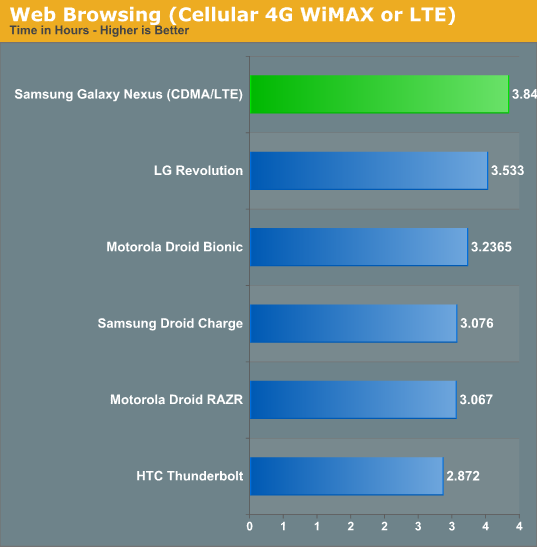
The Galaxy Nexus doesn't post numbers very far in front, but manages to come in the top of the pack on 4G LTE at just under 4 hours. This is a pretty impressive result, honestly, considering that CMC221 is likely made on the same 45nm manufacturing process as CMC220. Again, I'm impressed with the Galaxy Nexus' longevity even on 4G LTE.
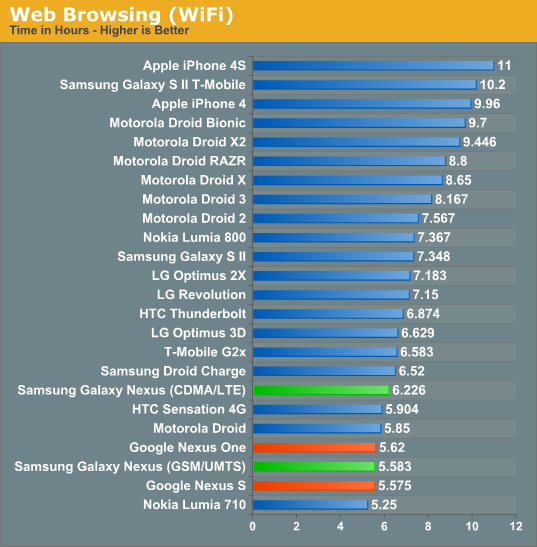
Surprisingly, the Galaxy Nexus can't break past that 6 hour mark even on WiFi, however, which does lead me to think we might be constrained by driving that display.
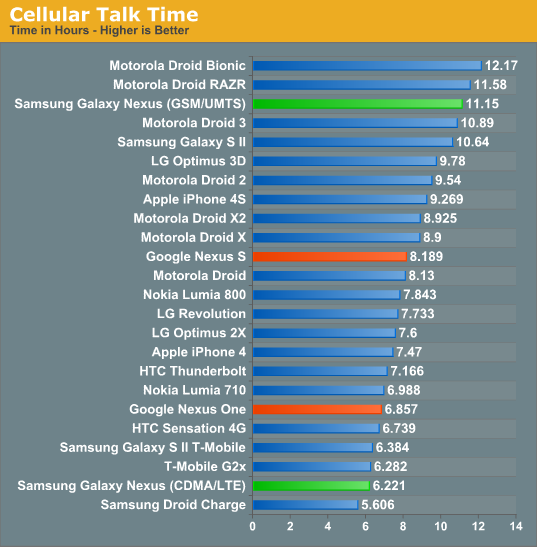
If you ever wanted to see how much difference having a different cellular architecture makes, see above. The GSM/UMTS Galaxy Nexus lasts impressively long on a voice call, at over 11 hours, yet its CDMA/LTE brother lasts just over half that.
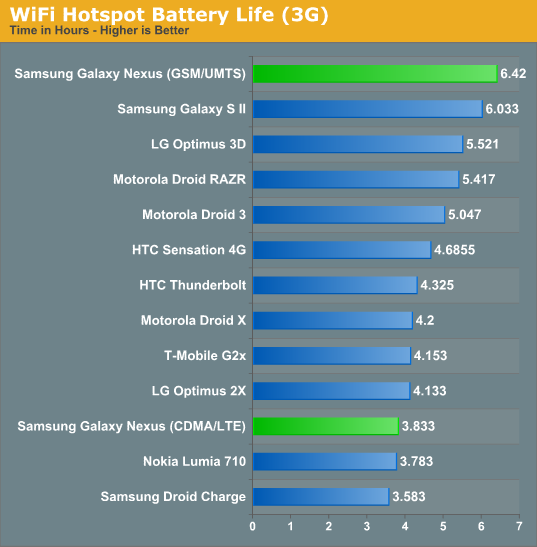
WiFi hotspot on 3G tells the same story - I'm not sure what Via Telecom's CBP7.1 draws in its active state for EVDO or 1x voice, but it seems to eat up more power than the XMM 6260 (X-Gold 626) in the GSM/UMTS Galaxy Nexus.
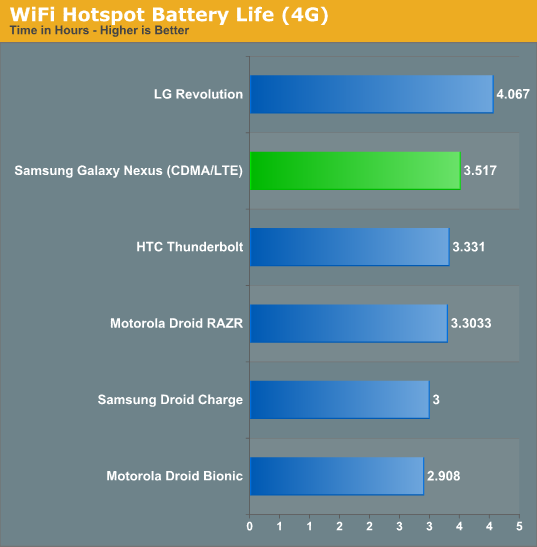
As a 4G LTE WiFi hotspot, the Galaxy Nexus loses its edge over the Revolution, but does come in just ahead of the rest of the 4G LTE herd.
The story of battery life on the Galaxy Nexus unsurprisingly depends on which variant you're talking about. For a phone with a 4.65" display, I'd say I'm impressed with the battery life on both devices - remember that the area that needs to get lit up goes as r^2 - increasing that and not killing the battery is a big feat. In addition, I'd wager that using the OpenGL ES renderpath (and accelerated browser in 4.0) definitely helped both Galaxy Nexus devices post impressive scores. As for the two variants, the GSM/UMTS device has impressively long battery life pretty much across the board. Playing with that phone, I was rarely wanting for more on my regular use schedule (I charge at night on my nightstand). We've seen XMM6260 before in numerous devices where it seems to be a pretty good citizen.
The CDMA/LTE variant, on the other hand, depends strongly on what air interface you end up using most - on 4G LTE the device comes in at the front of the pack usually, and its 3G web browsing test is above average. However, if you make a lot of voice calls, the phone might not cut it. Unsurprisingly the CDMA/LTE Galaxy Nexus does nothing to dramatically change 4G LTE battery life - for that we're still waiting for upcoming 28nm LTE basebands.










185 Comments
View All Comments
zorxd - Wednesday, January 18, 2012 - link
The Skyrocket is also 1.5 GHz so the CPU helps.sprockkets - Wednesday, January 18, 2012 - link
There's a very small bit of lag on the bottom buttons. Quite frankly I think the delay is just the OS making sure you are holding down the home button for the task manager instead of just going home.Using ICS on a HTC Sensation. The status of it is beta - HTC still has work to do on it to make it as good as the 2.3.4 ROM.
webmastir - Wednesday, January 18, 2012 - link
Love my Galaxy Nexus. Best phone I've ever had & have no DOUBT in my mind that I'll be happy until my next Phone.Thanks Google!
OCedHrt - Wednesday, January 18, 2012 - link
Since I can't get the HTC keyboard working on AOSP ICS...I have to make this comment: I prefer the HTC keyboard much much more than even the ICS keyboard. It is ridiculously easy to mistype on the ICS keyboard.vithee05 - Wednesday, January 18, 2012 - link
Can you guys tell me how the accessibility is in ICS? It's supposed to be better for those of us who are visually impaired. I am debating between the galaxy nexus, the razr, or waiting on the droid 4 to get the keyboard. Do you think the accessibility is good enough to not need the keyboard?secretmanofagent - Friday, January 20, 2012 - link
I have a Droid RAZR (2.3.5) in my hands, and looking at the accessibility settings, it's pretty paltry. If you're considering a RAZR or Droid 4, I would wait until ICS shows for it.tipoo - Wednesday, January 18, 2012 - link
I agree that its worlds better than the Gingerbread browser, but scrolling on image heavy pages still lags a bit compared to Opera Mobile (not to be confused with Mini). AFAIK Opera Mobile uses GPU acceleration as well and seems to do it better than Google at their own game. Just an idea, but a comparison of all the Android browsers would be nice :)tipoo - Wednesday, January 18, 2012 - link
*on my Nexus S. Maybe on newer/faster phones it would be a toss up.bjacobson - Wednesday, January 18, 2012 - link
Really? interesting. Opera seems to get everything right. Their browser is blazing fast for Netbooks too. Everything in the UI and foreground tab gets processing priority, everything else (like background tabs rendering) gets delayed. It's a flawless design, much more responsive than Chrome when loading multiple tabs.tipoo - Thursday, January 19, 2012 - link
Yeah, and as far as I know its the only browser that dynamically adjusts its memory use depending on how much your using for other tasks, so it scales up or down to more powerful or less powerful systems, another reason its good on netbooks. It has addons now too which are rapidly gaining traction. If it wasn't for some compatibility niggles I would say its hands down the best browser, but I keep Chrome around for the 1 in 1000 site it might break. Oddly enough the Mobile version seems to be the opposite, its the only mobile browser that I've never seen break a site.